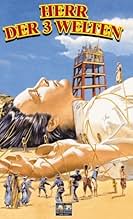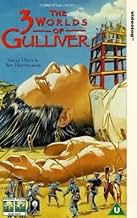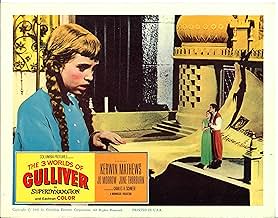Sobrevivente de naufrágio vai parar numa ilha habitada por pessoas minúsculas e depois foge dessa mesma ilha para outra, onde as coisas se invertem, agora ele é minúsculo perante ao povo des... Ler tudoSobrevivente de naufrágio vai parar numa ilha habitada por pessoas minúsculas e depois foge dessa mesma ilha para outra, onde as coisas se invertem, agora ele é minúsculo perante ao povo desta nova ilha.Sobrevivente de naufrágio vai parar numa ilha habitada por pessoas minúsculas e depois foge dessa mesma ilha para outra, onde as coisas se invertem, agora ele é minúsculo perante ao povo desta nova ilha.
- Direção
- Roteiristas
- Artistas
- King Brob
- (as Gregoire Aslan)
- Glumdalclitch
- (as Sherri Alberoni)
- Crewman
- (não creditado)
- Kings Guard
- (não creditado)
- Mrs. Dewsbury, Patient at Dr. Gulliver's
- (não creditado)
- Mr. Grinch
- (não creditado)
- Shrike - Makovan's Daughter
- (não creditado)
- Direção
- Roteiristas
- Elenco e equipe completos
- Produção, bilheteria e muito mais no IMDbPro
Avaliações em destaque
I'm sure the classic tale is familiar to most readers so I won't bother readdressing it, other than that this film concerns solely on the two kingdoms of Lilliput and Brobdingnan, ignoring the other minor lands of Swift's tale and concentrating on the most well-remembered ones. The first half of the film concerns Lilliput, and is boosted by some fine effects from Harryhausen which involve lots and lots of back and forward projection which is never less than convincing. Indeed the classic scene of Gulliver being tied down by the little people is present and as realistic as you could ever want it. The characters are interesting, the story good and bolstered by the likable presence of Kerwin Mathews, one of the most naturally charming of fantasy actors from the period who always lifted any movie he appeared in (another good one is JACK THE GIANT KILLER).
The second half of the film, concerning the land of the giants, isn't quite as good, but again the special effects of the miniature Mathews and Thorburn are better than average. Although it drags a little at times, the characters are interesting if not likable, and thankfully some stop-motion animation is interested by Harryhausen to enliven the proceedings. The creations include a briefly-seen but genuinely impressive giant squirrel which abducts Mathews, miniature animals kept in cages, and a miniature crocodile which then proceeds to battle Mathews in a fight to the death, a classic action moment which comes as a reward to those looking for Sinbad-style monster action.
THE 3 WORLDS OF GULLIVER is a film worth watching for the talent involved alone. As well as Mathews, the quality cast includes the lovely June Thorburn as the love interest and a whole host of familiar British character actors - including Charles Lloyd Pack in a meaty role for a change as an evil wizard - playing the miniature people and the giants. Bernard Herrman's score is also lively and always entertaining, whilst Harryhausen seamlessly integrates the large and small people so that you never for a moment doubt the quality of his effects. Not a classic, but a fine, friendly, old-fashioned adventure, as heartwarming and cliffhanging in equal measure as you could want. A TV-movie adaptation (with lots of unnecessarily-added extraneous scenes) with Ted Danson followed in the mid 90's.
I saw it as a 13 year old back in the day in theater which is really the only way to appreciate the special effects of Ray Harryhausen. It's a wonderful film for a juvenile, but later in reading about the times one can appreciate what Swift was trying to say and the humorous way he said it.
At the time Gulliver's Travels was originally written the age of the religious wars of the 17th century was coming to an end. Swift was a member of the Tory Party who sought to put an end to the War of Spanish Succession which the Whigs in power seemed to drag on and on. For the Whig view of the conflict I suggest strongly reading Winston Churchill's Life of Marlborough which equates the Tories of the day with the Baldwin-Chamberlain led Tories of the Thirties. Swift looked about and just saw a lot of carnage with power politics and religion all jumbled together so that you could not tell where one left off and the other began.
Gulliver's Travels is how Swift saw the world of his day, religious intolerance and a budding imperialism. Swift was in fact an ordained minister who apparently had a vision that HIS way of worship was not necessarily THE way of worship for all. A novel idea back then, expressed in the war the Lilliputians and Blefescuans wage over which end of the egg to break.
The Brobdingnag tale where Gulliver once a giant in Lilliput is now a small wee creature in a land of giants. And these giants think that because they're bigger and mightier they can rule over all. They see Gulliver and his bride as pets to kept as long as they amuse. It's a classic commentary against imperialism, unusual in its day and made Swift most unpopular in high places.
These issues aren't for kids of the Saturday matinée crowd and Kerwin Matthews as Gulliver is playing for them. Matthews had a great career doing these fantasy things and he was real good in them. Maybe because he played the roles absolutely straight and we believed because he believed the part.
Ray Harryhausen is at the top of his game and the film holds up very well. Even better in fact when you know the background from which the material came from.
Is this a film for children or a film for adults? The too-easy answer is that it is obviously a children's version: There is none of the trumped-up insanity element that the dreary-but-great-looking 1996 TV movie shoe-horned in for cheap drama. Neither is there the despair or genuine misanthropy of the book.
Only Lilliput and Brobdingnag are visited. (No Laputa, Balnibari, Luggnag, Glubbdubdrib, Japan, or Houyhnhnms. The third world is Gulliver's own normal-sized world.) Gulliver puts out the fire in Lilliput by spitting wine. (In the book, the wine has been processed by Gulliver's bladder before he douses the fire with it.) Many characters, though not all, are all done in a cartoonish way clearly aimed at children. The travels are framed within the added-on love story of Gulliver and his fiancée Elizabeth.
These are good choices. Children are inherently interested in the size contrasts. (It must add something to the experience that first they identify with the Lilliputians but later identify with Gulliver.) Spitting the wine is good enough. The cartoonish-ness makes the characters less threatening than they could have been. The love story is light and easy to follow, and promotes marriage.
There are even a couple of musical numbers, one a love song that Gulliver sings. The Bernard Herrmann score is a fine complement to the film, as you would expect from the composer of music for the original Psycho, Citizen Kane, Magnificent Ambersons, Ghost and Mrs. Muir, Day the Earth Stood Still, Alfred Hitchcock Presents (tv), Have Gun Will Travel (tv), Perry Mason (tv), Twilight Zone, Cape Fear (1962), Taxi Driver, and on and on and on.
But Sher's script and direction have preserved some important points and spirit from the book: The gratitude of princes is short-lived. The causes of war can be shockingly petty. Vanity and unreason among the powerful make truth an early casualty in the pursuit of power. The various unpleasant characters (and the few nice ones) actually reflect things inside all of us. If it's okay for an adult to be reminded of these things in a playful way (certainly more playful than the original), then this film will amuse and inform that adult.
And what are Gulliver and Elizabeth doing when their ball-field sized marriage license falls over them like a tent, and King Brob, peeking under it, is moved to say, "You're right dear. I'd better marry them at once."
Ultimately, it has to go down in the books as a children's film, but surely an uncommon one: an intelligent adaptation, if abridged and lighthearted, of a great classic, that stands on its own for entertainment and, if you like, can whet your child's appetite for the book when that time arrives.
Like the tacked-on love story, there is a tacked-on ending that suggests that the whole thing might have been a dream. I originally found this annoying.
These days, watching with my little girl, I find that I'm glad for the admittedly sore-thumb reminder that the value of the story is not in whether those characters do or don't exist, but in what the story says about what is within us. As with all such points in the film, you'll have to talk with your child a bit to be sure that it comes across, but what a pleasure - to find a film that sparks such a discussion with your child.
-------------------------------------------------------------------------- --------------------------------------
Other works by Jack Sher:
-------------------------------------------------------- Writer - filmography -------------------------------------------------------- Female Artillery (1972) (TV) (story) Goodbye, Raggedy Ann (1971) (TV) Move Over, Darling (1963) Critic's Choice (1963) Love in a Goldfish Bowl (1961) Paris Blues (1961) 3 Worlds of Gulliver, The (1960) ... aka Worlds of Gulliver, The (1960) Wild and the Innocent, The (1959) Kathy O' (1958) (also story) Joe Butterfly (1957) Four Girls in Town (1956) Walk the Proud Land (1956) ... aka Apache Agent (1956) World in My Corner (1956) (also story) Kid from Left Field, The (1953) Off Limits (1953) ... aka Military Policemen (1953) (UK) Shane (1953) (additional dialogue) My Favorite Spy (1951)
-------------------------------------------------------- Director - filmography -------------------------------------------------------- Love in a Goldfish Bowl (1961) 3 Worlds of Gulliver, The (1960) ... aka Worlds of Gulliver, The (1960) Wild and the Innocent, The (1959) Kathy O' (1958) Four Girls in Town (1956)
(with thanks to The Internet Movie Database http://www.imdb.com)
I never read the book it was based on so I can't make comparisons...but the book was a political satire. Obviously this does not make it into the movie--this is aimed squarely at kids. The characterizations are broad (to say the least) and some of the characters act like total idiots (to amuse the kids). It also has simplistic (if amusing) remarks on how war is evil and people have to live for themselves. The story moves haltingly--it seems large chunks were either not filmed or left on the cutting room floor. Also Mathews breaks into song (!!!) at one point. It's more than a little silly but Mathews does have a great singing voice. Also the special effects by Ray Harryhausen aren't really that special--they're more than obvious.
The film is very colorful and I was never really bored--most of the time though I was trying to figure out what was going on. Kerwin Mathews was easily one of the best-looking men ever to come out of Hollywood. His acting is just OK but really--the guy had to react to things that just weren't there. That couldn't have been easy. So the color and Mathews kept me entertained...but most adults will probably be thoroughly bored. I think kids will like it but I can only truthfully give it a 6.
Swift's biting satirical novel has been watered down and given a romantic edge for the family market. That said, as the kids are enjoying the froth and tickle, the adults will note that there's just enough caustic comment in the piece to get the message across. This adaptation has slimmed down the four parts of Swift's work to just the two; Lilliput land of the little people and Brobdingnag land of the giants. With our intrepid normal sized hero Gulliver and his stowaway fiancée Elizabeth under threat either way.
While the script has its pleasing moments it is still only serving as a bridging work for Harryhausen's effects to be shown. Be it the giant and tiny people sequences or the perils that come to our undersized protagonists courtesy of a Gator and a Squirrel, it's these that the children will find beguiling. This, however, can not be said for Harryhausen aficionados or adults more accustomed to more modern advancements. For this is bottom rung for Harryhausen, not bad at all, yet although there's a charm here, and no one should ever dismiss the painstaking amount of time it took him to weave it together, the work is creaky and lacking the dynamism so befitting his best work.
Major bonus' come with the swirling and pounding score from Herrmann and the vibrant performance of Matthews. The role of Gulliver was first offered to Danny Kaye, which naturally makes sense given Kaye's previous work on Hans Christian Andersen some years earlier. That it was also offered to Jack Lemmon, though, makes no sense at all. Anyway, Matthews got the gig, and following on from his fine work in The 7th Voyage of Sinbad, he laid down a marker in the fantasy adventure genre that secured him fondness from legions of fans throughout the years. A safe, colourful and pleasant enough piece if ultimately not one for most fantasy adventure fans to revisit often. 6/10
Você sabia?
- CuriosidadesThis was Mary Ellis' final film before her death on January 30, 2003 at the age of 105.
- Erros de gravaçãoThe quantity, type and relative size of fish caught by Gulliver in his hat on the beach in Lilliput changes between his point of view and when he drops them at the feet of the Lilliputians.
- Citações
Dr. Lemuel Gulliver: ...you don't need Reldresal or me to fight a war!
Emperor of Lilliput: Of course I don't need a prime minister to fight a war! But I need one to blame in case we lose it.
- Cenas durante ou pós-créditosOpening credits prologue: Wapping, England 1699
- ConexõesFeatured in Monsters and Magic (1972)
Principais escolhas
- How long is The 3 Worlds of Gulliver?Fornecido pela Alexa
Detalhes
- Data de lançamento
- Países de origem
- Idioma
- Também conhecido como
- As Aventuras de Gulliver
- Locações de filme
- Alcázar de Segovia, Segovia, Castilla y León, Espanha(Castle of Brobdingnag exteriors)
- Empresa de produção
- Consulte mais créditos da empresa na IMDbPro
- Tempo de duração
- 1 h 39 min(99 min)




































